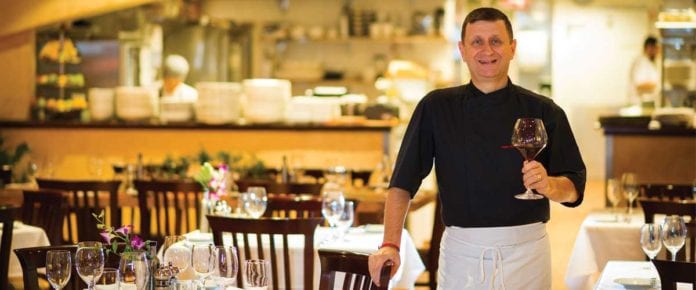First, do no harm. So goes the bioethical maxim medical students are taught to guide their conduct. Giuseppe (Pino) Posteraro would have been familiar with it, given his originally chosen field. But while a jarring encounter during second-year medical school upended his plans to be a doctor, Posteraro found a fruitful application for the tenet in another profession that flexes its mettle in generous service to the public. “I didn’t like seeing people suffering,” he says. “I wanted a job that would put smiles on people’s faces.”
Posteraro’s restaurant, Cioppino’s Mediterranean Grill & Enoteca, is a critically acclaimed Italian eatery in the Yaletown neighbourhood of Vancouver espousing the cucina naturale style of cooking. Posteraro opened the 10,000-sq.-ft., 188-seat space in 1999 and today it’s one of Vancouver’s most award-winning restaurants, consistently attracting gold medals and restaurant-of-the-year prizes for its inventive menu, stellar wine pairings and its founder’s novel approach to not only food preparation but corporate management as well.
Posteraro launched his career by taking summer jobs in restaurants in his native Italy. At home his mother, the daughter of an aristocratic family who’d studied with professional chefs in Naples and Rome, infused his soul with a passion for food. “She had to make necessity a virtue,” Posteraro remembers of her 12-hour days in the kitchen cooking for six children. She should by all rights have opened a restaurant, he says, but an old-school mentality kept her at home where she excelled at baking bread, making desserts, preparing lavish meals for Easter Sunday and celebrating the seasonal ingredients of her natural surroundings. That meant preserving tomatoes, harvesting grapes and pressing olives. In the beginning, says Posteraro of his required participation in these activities, “I wasn’t thrilled, but then I became hooked. Today, I know I was privileged to do it — I got real hands-on experience.”
It was by working with his brother, Celestino, first at the Town Hall restaurant in Markham, Ont., and then at the eponymous Celestino’s in Toronto in 1987, that he “discovered this natural talent and started to take courses.” Brian Cooper, then dean of George Brown College’s Hospitality Centre, noted the passion in his new student and Posteraro was soon teaching at the school. He and Celestino established an Italian culinary arts course that included internships at restaurants in Italy and today, Posteraro’s picture hangs on the wall of the college’s Centre for Hospitality and Culinary Arts.
After a fevered stint travelling among Michelin-starred restaurants in Europe, a five-star property in Singapore and a cooking school in Tuscany, he opened an Italian-Mediterranean restaurant called Borgo Antico in Toronto in 1995. It was successful, but Posteraro sold it and moved back to Italy a year later. In 1999, he moved to Vancouver and opened Cioppino’s.
Posteraro’s mother died before she got a chance to see him achieve meaningful success as a restaurateur. “But she would be proud,” he says. “I reproduce today, with 2015 standards, exactly what she was doing in the 1970s.” That includes his mom’s capacity to transmit happiness and serenity to the dining experience. Thanks to her, he says, cooking is a therapeutic exercise during which “everything else goes away.” He takes pride in conveying that same tranquility to his customers, and bristles at what he perceives to be a prevailing mood of critical negativity in the restaurant business.
“We do a vivisection of every meal and are obsessed with finding the wrong instead of the right.” While he applauds legitimate efforts to identify and correct technical problems with dishes, he despairs over how food shows and social media have “elevated us all to food critics.”
Posteraro loves Italian cuisine for its integrity — it’s more about ingredients than techniques and celebrates the “Italian-Mediterranean mentality,” in which less is more. At his restaurant, which employs 45 full-time staff and records annual sales of approximately $8 million, he delights in serving fresh and tasty food. Other restaurants, he says, make great play of their “authentically Italian food,”importing ingredients from across the sea at great expense and trouble without acknowledging they’re in close proximity to some special ingredients of their own. “They don’t understand that it’s anachronistic to do a cuisine that’s 100-per-cent Italian without taking into consideration that we’re in Canada.” At his restaurant he integrates “what Canada has to offer” with “the cultural and gastronomic roots of Italy.” Think Italian-born extra virgin olive oil with salmon from the Pacific and tomatoes from the Okanogan.
The best part of running his own restaurant, Posteraro says, is the triumph of achieving a balance between a passion for food and a facility for business. “If I do things that are ethically sound as a chef, I’ll be successful as a businessperson,” he says. “It’s not a gimmick; it’s the way I am.”
Cristiano Posteraro, Pino’s nephew and Cioppino’s chef de cuisine, tells a story that illustrates this. A visiting American customer asked Pino if he remembered the wine he’d enjoyed on his last stop, three years earlier. Without hesitation, the restaurateur plucked the exact bottle from his stash. “One of the things people love about going to a restaurant is being known,” says Cristiano. “It gives them a sense of comfort and importance and it’s an extremely important quality in this industry.”
Ultimately, says his uncle, it’s about the customer experience. “It’s not about me. I create a nice environment where fine dining isn’t pretentious. People feel comfortable, the way they would if they were at the home of an Italian family. I want to be remembered as someone who’s been honest and has had integrity all his life, in his personal life and in cooking.”
“Pino is always there,” confirms Gary Ross, a communications consultant who visits the restaurant often to eat zucchini blossoms and spaghetti alle vongole (served with Baynes Sound Manila clams and a parsley white wine-garlic sauce for $30) and to drink the wine his buddy so perfectly pairs with his dishes. “He’s the opposite of the absentee proprietor, and also the opposite of the celebrity chef who lusts after his own show. He’s had many offers to open another restaurant, but his attitude is: ‘I’d be spreading myself too thin.’ That seems atypical to me. He’s such an inventive chef, he’s really interested in food and really smart. People who have money and taste go there to eat — like the vice-president of the United States or George Clooney or the chairman of Telus.”
Up next, Posteraro has plans to open a casual restaurant specializing in quicker, lighter — and more affordable — Mediterranean fare. Left in his past: the memory of suffering his early professional forays produced. In its place: an exuberant tradition of indulging foodies and Italophiles with pappardelle with four-hour braised veal cheeks and porcini mushrooms ($25) in the stylish environment of his own loving creation. “Today,” the chef says, “I see only smiles.”
Story By: Laura Pratt
Volume 48, Number 9


















